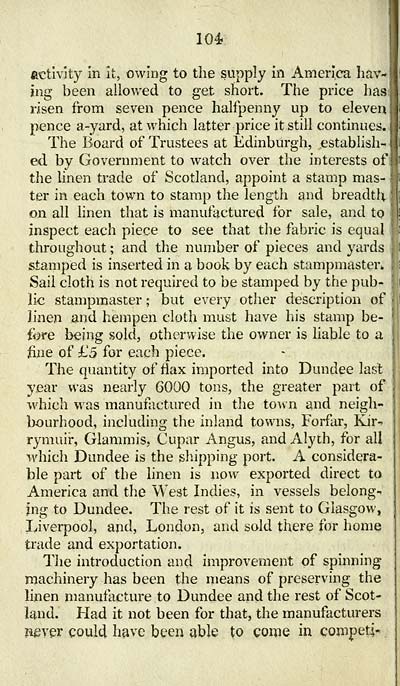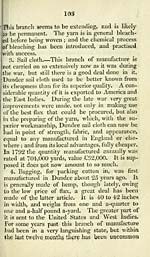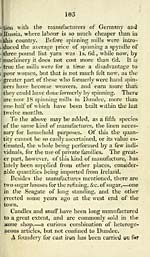Towns > Dundee > 1822 - Dundee delineated; or, A history and description of that town, its institutions, manufactures and commerce
(110)
Download files
Complete book:
Individual page:
Thumbnail gallery: Grid view | List view

104
activity in it, owing to the supply in America hav-j
ing been allowed to get short. The price has]
risen from seven pence halfpenny up to eleven;
pence a-yard, at which latter price it still continues, i
The Board of Trustees at Edinburgh, establish-
ed by Government to watch over the interests of
the linen trade of Scotland, appoint a stamp mas-
ter in each town to stamp the length and breadth
on all linen that is manufactured for sale, and to
inspect each piece to see that the fabric is equal
throughout ; and the number of pieces and yards
stamped is inserted in a book by each stampmaster*
Sail cloth is not required to be stamped by the pub-
lic stampmaster ; but every other description of
linen and hempen cloth must have his stamp be-
fore being sold, otherwise the owner is liable to a
fine of £5 for each piece.
The quantity of flax imported into Dundee last
year was nearly 6000 tons, the greater part of
which was manufactured in the town and neigh-
bourhood, including the inland towns, Forfar, Kir^
rymuir, Glammis, Cupar Angus, and Alyth, for all
which Dundee is the shipping port. A considera-
ble part of the linen is now exported direct to
America and the West Indies, in vessels belong-
ing to Dundee. The rest of it is sent to Glasgow,
Liverpool, and, London, and sold there for home
trade and exportation.
The introduction and improvement of spinning
machinery has been the means of preserving the
linen manufacture to Dundee and the rest of Scot-
land. Had it not been for that, the manufacturers
never could have been able to gome in compel!-
activity in it, owing to the supply in America hav-j
ing been allowed to get short. The price has]
risen from seven pence halfpenny up to eleven;
pence a-yard, at which latter price it still continues, i
The Board of Trustees at Edinburgh, establish-
ed by Government to watch over the interests of
the linen trade of Scotland, appoint a stamp mas-
ter in each town to stamp the length and breadth
on all linen that is manufactured for sale, and to
inspect each piece to see that the fabric is equal
throughout ; and the number of pieces and yards
stamped is inserted in a book by each stampmaster*
Sail cloth is not required to be stamped by the pub-
lic stampmaster ; but every other description of
linen and hempen cloth must have his stamp be-
fore being sold, otherwise the owner is liable to a
fine of £5 for each piece.
The quantity of flax imported into Dundee last
year was nearly 6000 tons, the greater part of
which was manufactured in the town and neigh-
bourhood, including the inland towns, Forfar, Kir^
rymuir, Glammis, Cupar Angus, and Alyth, for all
which Dundee is the shipping port. A considera-
ble part of the linen is now exported direct to
America and the West Indies, in vessels belong-
ing to Dundee. The rest of it is sent to Glasgow,
Liverpool, and, London, and sold there for home
trade and exportation.
The introduction and improvement of spinning
machinery has been the means of preserving the
linen manufacture to Dundee and the rest of Scot-
land. Had it not been for that, the manufacturers
never could have been able to gome in compel!-
Set display mode to: Large image | Transcription
Images and transcriptions on this page, including medium image downloads, may be used under the Creative Commons Attribution 4.0 International Licence unless otherwise stated. ![]()
| Scottish Post Office Directories > Towns > Dundee > Dundee delineated; or, A history and description of that town, its institutions, manufactures and commerce > (110) |
|---|
| Permanent URL | https://digital.nls.uk/85825351 |
|---|
| Description | Directories of individual Scottish towns and their suburbs. |
|---|
| Description | Around 700 Scottish directories published annually by the Post Office or private publishers between 1773 and 1911. Most of Scotland covered, with a focus on Edinburgh, Glasgow, Dundee and Aberdeen. Most volumes include a general directory (A-Z by surname), street directory (A-Z by street) and trade directory (A-Z by trade). |
|---|


